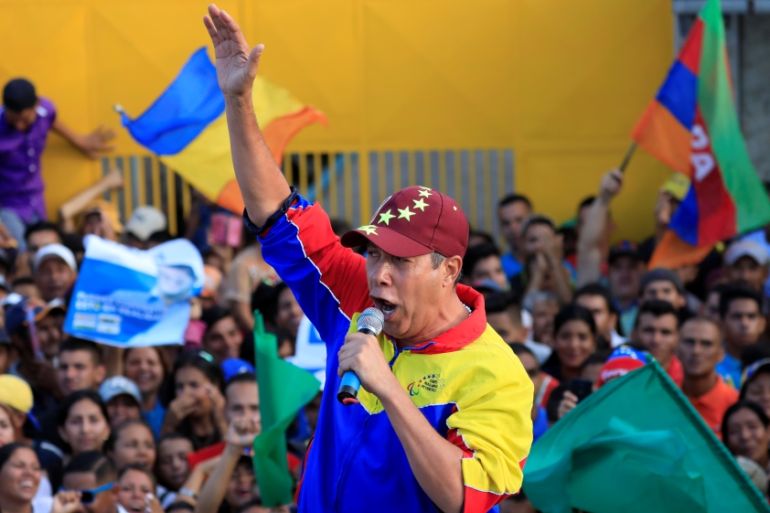Venezuela in a quagmire
With the main opposition parties boycotting the polls, President Nicolas Maduro poised for re-election despite a low approval rating.

Caracas, Venezuela – Some say that Venezuelan presidential candidate Henri Falcon is attempting the political equivalent of climbing to the top of Mount Everest alone – and without oxygen.
Once a staunch supporter of deceased populist leader Hugo Chavez, the former Lara State governor broke with the Socialist party in 2010.
Keep reading
list of 4 itemsShip that caused deadly Baltimore Key bridge collapse towed to port
‘Why should we vote?’ India’s jute workers blame politicians for woes
California farmworkers cheer new housing in town scarred by mass shooting
He is now promising to “save Venezuela from a dictatorship and economic ruin” if he is elected president on May 20.
Falcon is one of three outsiders in a race where the main opposition parties are conspicuously absent from the ballot. They are declaring the vote a “sham” and appealing to Venezuelans to stay away from the polls.
“On May 20, there are no elections,” said Juan Pablo Guanipa, of the opposition Voluntad Popular Party. “We aren’t talking about abstention or of not voting.”
“We simply won’t participate in a farce,” he added. “We don’t recognise the event that will take place as a legitimate election.”
On the eve of the election, Maduro’s Minister of Communications Jorge Rodriguez lashed out at domestic and international critics.
“It is very strange that the international community is declaring a fraud even before the election takes place,” Rodriguez said.
Maduro poised for re-election
An estimated three million Venezuelans have fled the country to escape widespread shortages of food and medicine, hunger, violence and hyperinflation that could reach 16,000 percent by the end of the year.
Still, President Nicolas Maduro is widely expected to be re-elected despite his approval rating hovering at around 20 percent, according to local polls.
|
|
Critics say that’s the case because he has amassed all of the state’s power and resources, including the electoral authorities, the media and food subsidies, to ensure victory.
They underscore that, Maduro has seen to it that his strongest rivals are in prison, in exile or have been declared ineligible to run and draw attention to the supervision of the election.
Following the 2017 Constituent Assembly elections, SMARTMATIC, a UK-based company that has long provided Venezuela’s voting machines, accused the government of manipulating the turnout vote by as much as a million phantom votes.
Predictably, SMARTMATIC is no longer providing its services.
The opposition’s call to boycott the poll is also expected to give Maduro a considerable advantage.
‘Uneven playing field’
“He doesn’t have to steal the election. The MUD [Democratic Unity Table opposition coalition] is serving him victory on a silver platter,” said Falcon.
And that is why he says he is running.
“Of course, the playing field is uneven and the conditions unfair,” Falcon told Al Jazeera.
“But not taking part in this election is not an option. What are the alternatives? A foreign invasion? “International economic sanctions that will punish Venezuelans who are already living a humanitarian crisis? A military coup? All of these would be a disaster!”
He added: “They can’t steal victory from us if we stand together”.
But many of Maduro’s opponents don’t trust him.
“What’s to stop him from switching sides again? Falcon’s candidacy simply legitimises an illegitimate election,” said MUD supporter Juan Rodriguez.
The playing field is uneven and the conditions unfair, but not taking part in this election is not an option.
Luis Vicente Leon, director of polling firm Datanalisis, says that the opposition as a whole is making a terrible strategic mistake.
“Both options – to boycott the election or to take part – have rational arguments,” says Leon.
“But what is clear is that by refusing to unite to either vote or abstain, the two opposition strategies lose strength,” he told Al Jazeera.
“Neither option stands a chance if they stand divided.”
As for Maduro, he vows to launch “an economic revolution” after May 20 to restore prosperity to what was one of Latin America’s richest countries.
Venezuela’s oil production is down to half of its pre-2010 output, and the government admits it is struggling to avoid defaulting on its foreign debt.
This is one of the reasons why it can no longer afford to continue importing desperately-needed medicine and food that Venezuela no longer produces.
The president says he is no longer a novice; he is now “maduro”, the Spanish word for mature.
A clever play with words, perhaps, that will do little to ease global economic and political pressure on a leader whose legitimacy is questioned by a growing number of countries.